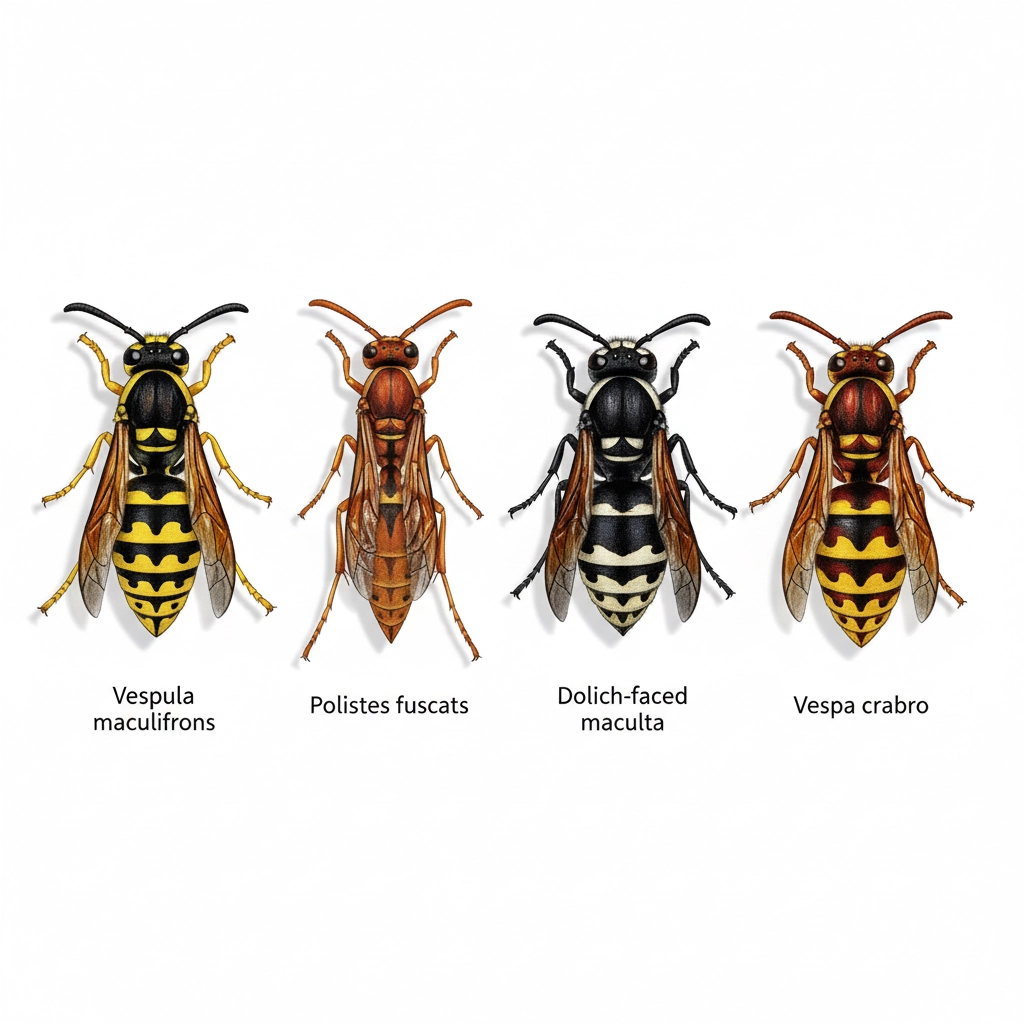Are Wasp Stings Bad? Ontario's 2025 Wasp Surge Explained (Plus 5 Safe Removal Tips)
- Targeted Wildlife and Pest Solutions

- Sep 27, 2025
- 5 min read
If you've noticed more wasps around your Haliburton County property this year, you're not imagining things. Ontario experienced an unprecedented wasp surge in 2025, and property owners throughout the region have been dealing with increased encounters with these aggressive insects.
Wasp stings are indeed dangerous and should never be taken lightly. Beyond the immediate sharp pain, wasp stings can trigger severe allergic reactions, cause localized swelling, and in some cases, lead to life-threatening anaphylactic shock. Unlike bees, wasps can sting multiple times, injecting venom with each attack. For children, elderly individuals, or anyone with existing allergies, even a single sting can become a medical emergency.
Understanding Ontario's 2025 Wasp Surge
The perfect storm of weather conditions created ideal circumstances for wasp populations to explode across Ontario this year. Three key factors contributed to this surge:
Mild Winter Conditions: The unusually mild winter of 2024-2025 allowed more wasp queens to survive hibernation than in typical years. These surviving queens established new colonies in spring, dramatically increasing the baseline population.
Wet, Warm Spring: The combination of adequate moisture and warm temperatures in early 2025 provided optimal conditions for rapid colony development. Wasp larvae had abundant food sources, and colonies grew faster and larger than normal.
Hot, Dry Summer: The intense heat accelerated natural development cycles, causing the wasps' primary food sources: caterpillars and other insects: to mature and disappear earlier than usual. This forced wasp colonies to seek alternative food sources much sooner, bringing them into direct conflict with human activity.
Peak wasp activity occurred from late August through September 2025, when most natural prey had vanished. During this period, wasps became increasingly aggressive in their search for protein sources like barbecue meat and sugary drinks at outdoor gatherings.

Common Wasp Species in Haliburton County
Understanding which wasps you're dealing with helps determine the appropriate response strategy:
Yellow Jackets: The most aggressive species in our region, yellow jackets build ground nests and wall cavities. They're attracted to meat and sugary substances, making them frequent uninvited guests at outdoor meals. Their stings are particularly painful and they can sting repeatedly.
Paper Wasps: These wasps create distinctive umbrella-shaped nests under eaves, decks, and overhangs. While less aggressive than yellow jackets, they will defend their nests vigorously when threatened.
Bald-Faced Hornets: Actually a type of yellow jacket, these larger wasps build distinctive gray, football-shaped nests in trees and shrubs. They're highly aggressive and their stings are exceptionally painful.
European Hornets: The largest wasp species in Ontario, European hornets are active both day and night. They typically nest in hollow trees or wall voids and can cause significant structural damage.
5 Safe Removal and Prevention Tips
1. Identify Before You Act
Never attempt removal without first identifying the wasp species and nest location. Different species require different approaches, and misidentification can lead to dangerous encounters. Paper wasps are generally less aggressive and easier to manage, while yellow jackets and hornets pose significant risks that often require professional intervention.
Observe the nest from a safe distance during daylight hours. Note the size, shape, and location, as well as the activity level around the nest. This information will help determine whether DIY removal is appropriate or if professional help is necessary.
2. Time Your Approach Correctly
If you decide to attempt removal of a small, accessible nest, timing is crucial. Wasps are least active during early evening or nighttime hours when most workers have returned to the nest. Never attempt removal during peak daytime activity when wasps are most aggressive and likely to defend their territory.
Temperature also matters. Cool weather (below 50°F) reduces wasp activity significantly, making removal safer. However, remember that even sluggish wasps can still sting if provoked.

3. Use Proper Safety Equipment
Complete protective gear is non-negotiable for any wasp removal attempt. Essential equipment includes:
Long-sleeved shirts and long pants made of thick material
Gloves that cover your wrists completely
Closed-toe shoes with socks
Face protection or a bee veil
Light-colored clothing (wasps are more aggressive toward dark colors)
Even with proper equipment, maintain a planned escape route and have another person present who can call for help if needed.
4. Apply Targeted Treatment Methods
For small, accessible nests, soapy water can be an effective treatment. Mix liquid dish soap with water in a spray bottle: the soap suffocates wasps by coating their breathing pores. Completely saturate the nest and surrounding area, then retreat to a safe distance.
Commercial wasp sprays can be effective but require careful application. Choose products designed for the specific wasp species you're targeting, and follow all label instructions precisely. Never use these products in windy conditions or near children and pets.
5. Prevent Future Infestations
Prevention remains your best strategy for long-term wasp control:
Seal potential nesting sites like wall cavities, roof gaps, and deck crevices
Remove food sources by keeping garbage cans tightly covered
Clean up fallen fruit from trees promptly
Avoid wearing bright colors or floral patterns when outdoors
Install wasp decoys early in the season to deter new colonies
Regular property inspections in early spring can help you identify and address potential nesting sites before wasps establish colonies.
When Professional Intervention is Essential
Certain situations always require professional pest control services. Contact Targeted Wildlife and Pest Solutions immediately if:
Nests are located in high-traffic areas near doors or frequently used spaces
You're dealing with large colonies or multiple nests
Previous removal attempts have failed
Anyone in your household has known allergies to wasp stings
Nests are in hard-to-reach locations like wall voids or high branches
Professional pest control technicians have specialized equipment, protective gear, and treatment methods that ensure complete elimination while minimizing risk to your family and pets. They can also identify and seal potential re-infestation sites that homeowners often miss.
The Importance of Professional Wasp Control
At Targeted Wildlife and Pest Solutions, we understand that wasp control requires more than just removing visible nests. Our comprehensive approach includes:
Thorough Property Assessment: We identify all current nesting sites and potential future locations, providing you with a complete picture of wasp activity on your property.
Species-Specific Treatment: Different wasp species require different treatment methods. Our technicians are trained to identify species accurately and apply the most effective treatment for each situation.
Safe Application Methods: We use professional-grade equipment and protective measures that ensure complete nest elimination while protecting your family, pets, and beneficial insects like bees.
Follow-Up Services: Wasp control often requires multiple treatments. We provide ongoing monitoring and additional treatments as needed to ensure complete elimination.
Prevention Planning: Beyond immediate removal, we help you implement long-term prevention strategies to reduce the likelihood of future infestations.
The wasp surge of 2025 demonstrated how quickly these dangerous pests can overwhelm residential properties. While natural wasp activity will decline with the first hard frost, the large number of surviving queens means 2026 could present similar challenges without proper prevention measures.
Don't risk your family's safety attempting to handle aggressive wasp colonies on your own. Contact Targeted Wildlife and Pest Solutions for professional, effective wasp control that protects your property and provides peace of mind throughout the active season.
Comments